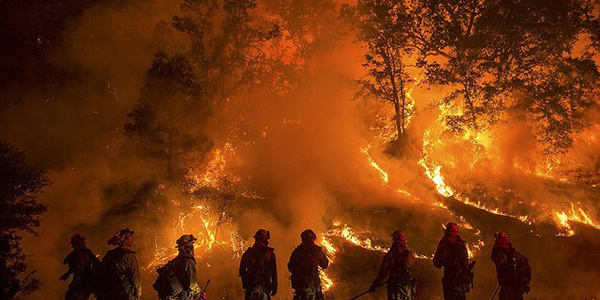A fire that killed four residents and destroyed more than 200 structures last September started when a leaning tree struck a Pacific Gas and Electric power line, the California Department of Forestry and Fire Protection (Cal Fire) said Monday.
The Zogg Fire burned more than 56,000 acres in rural Northern California near the community of Igo in Shasta County. Those who died in the blaze included a mother and her 8-year-old daughter, who were overtaken by flames as they fled.
“After a meticulous and thorough investigation, Cal Fire has determined that the Zogg Fire was caused by a pine tree contacting electrical transmission lines owned and operated by Pacific Gas and Electric,” Cal Fire said in a brief statement.
PG&E responded Monday night with a statement saying it “has fully cooperated with Cal Fire’s investigation. While we have not been given access to Cal Fire’s report or evidence it collected, we look forward to reviewing both when we are allowed to do so.”
Cal Fire’s findings were not a surprise. Federal Judge William Alsup, who oversees PG&E’s criminal probation from the 2010 San Bruno gas explosion, has said for months he believed that the leaning gray pine was the likely cause. The line it hit remained energized even though PG&E had ordered widespread public safety power shutoffs (PSPS) in the surrounding area because of high winds. (See PG&E Line Was Active when Zogg Fire Started.)
“I think it was reckless, maybe criminally reckless, for PG&E to have left that tree, that gray pine looming,” Alsup said in a February hearing. “It was leaning at a 60-degree angle over that line. Gray pines … have a shallow root system. That tree had also been burned earlier. That tree was a clear and present danger to the line, and whoever made the decision to leave that tree up should be looked at very carefully. And PG&E did leave it up.”
PG&E has tacitly acknowledged its equipment may have started the fire. It told the U.S. Securities and Exchange Commission in December that it expects to pay victims at least $275 million in damages, though it stopped short of admitting responsibility.
The official determination that PG&E equipment started a catastrophic wildfire for the fourth year in a row means the state’s largest utility likely faces continuing financial troubles and scrutiny by regulators, lawmakers and Alsup.
Cal Fire blamed the utility’s equipment for starting the devastating Northern California wine country fires of October 2017; the Camp Fire, which killed 85 people and leveled the town of Paradise, in November 2018; and the Kincade Fire, which tore through Sonoma County in October 2019.
The company filed for bankruptcy protection in January 2019 and emerged from Chapter 11 proceedings in June, after agreeing to pay a total of $25.5 billion to fire victims, insurance companies and local governments for the wine country fires and the Camp Fire.
Efforts to prevent the utility’s equipment from starting new fires are continuing as the state heads into its 2021 fire season.
PG&E filed its latest wildfire mitigation plan with the California Public Utilities Commission in February. It said the $3 billion plan uses advanced computer modeling to target high-risk fire areas for system hardening and vegetation management. (See PG&E Files Wildfire Plan Under Intense Scrutiny.)
Alsup has said he may impose new probation conditions on PG&E related to its vegetation management. The CPUC is seeking enhanced oversight of the utility’s vegetation management practices and line maintenance.
State regulators and lawmakers are also trying to rein in PG&E’s extensive use of PSPS to prevent fires, which caused public and official outrage in recent years.




